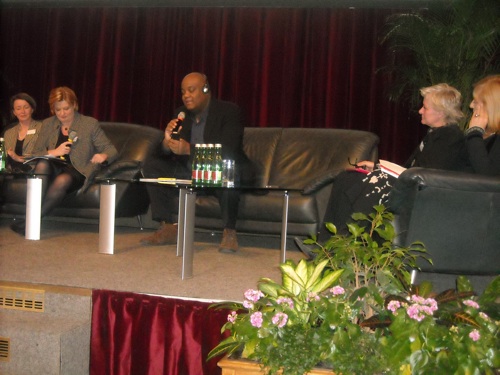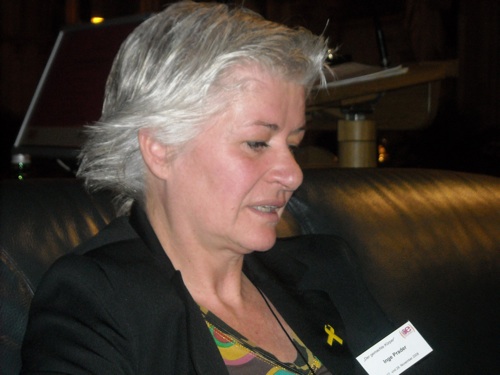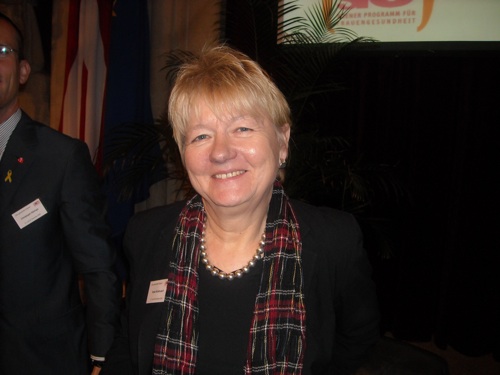
I recently had the good fortune of being invited to screen my documentary America the Beautiful, at the Shaped Body Symposium in Vienna, Austria, a global body image conference, which included professors, health professionals, and government representatives from all over the world. This was the European premiere of my film and I was really looking forward to hearing the European perspective on body image issues.
After screening the film for the conference, I sat on an impressive panel with some of Europe's most outspoken activists on body image issues, and listened to them discuss the issues explored in my film.

German Fashion photographer Inge Prader is on the frontlines of this battle. Prader explained that the pressure on models in Paris is getting worse and noted that some have gone so far as to swallow cotton balls to lose weight.

This got me thinking about the dangerous consequences of the images of air-brushed, too-thin women flashing across television screens and appearing on every other page of magazines which target impressionable teenage girls. Then I thought of the advertising industry dictating to us what we should find beautiful and selling us cosmetics designed to "make" ourselves beautiful.
As economic globalization becomes a reality, it seems that the language of beauty changes along with it. Those air-brushed women now appear on televisions in Toledo, Ohio and Toledo, Spain, and in magazines sold in Paris, Texas and Paris, France.
I don't know if we can pin it all on advertising and the media, but there is no doubt in my mind that it plays a significant part in hastening the scourge of body image issues and the rise in eating disorders all around the planet at an alarming rate. This brings me to what I like to call the "Fiji Phenomenon."
You see in Fiji, set apart from Western Society by a large expanse of the Pacific Ocean, television didn't exist until 1995. Because feeding their communities was of primary concern to Fijians, the culture celebrated larger body types. Those who appeared to be well-fed (and more well-to-do) were looked upon as the most beautiful. To put it simply, "thin was not in."
Prior to the introduction of television and Western media, a Harvard study led by Dr. Anne Becker, found that eating disorders in Fiji did not exist. But after three years of broadcasting Western programming guess what happened?
Sadly by 1998, over 70% of young women surveyed admitted that they had a negative body image, 60% of the young women surveyed admitted to dieting, and somewhere around 11% admitted bulimic behaviors. I found this phenomenon shocking. Terrifying even.
Does media and advertising really have that strong of an affect on how we see ourselves? It is hard to ignore a study conducted by the vaunted Harvard School of Medicine -- especially when the study finds that in a short three years, there was a larger proportion of dieting adolescents in Fiji than in Massachusetts!
While my film America The Beautiful deals primarily with the rise in body image issues and companion eating disorders in the American society, I felt absolutely compelled to include a segment of the film highlighting the "Fiji Phenomenon." Unfortunately, some of the negative aspects of our society have been exported along with the good.
Attending the Shaped Body conference again reminded me, that it is not just American women who are suffering with body image issues and eating disorders. To be sure, it is not only American women who are bombarded with a notion of beauty that is unrealistic and dangerous.
Fellow panel member, and long-time health expert for the World Health Organization in Switzerland, Professor Ilona Kickbusch noted that in this digital age, pictures travel globally with great ease. She stressed that in order to curb this problem it is imperative to take political action. And you know what? She is absolutely right.

This is a global pandemic. From Japan and China, to India and Iraq, to Nigeria and South Africa, to Vienna to Milan -- women from every corner of the globe are fighting this growing problem. And the question is, what are we going to do about it?
Perhaps if we took Professor Kickbusch's advice and tackled this problem using the political apparatus we could actually make a difference. Remember how people laughed ten years ago at the notion of passing a public smoking ban? Hell, fifteen years ago they even thought banning smoking on airplanes would never fly. With political support and money behind the movement, look how quickly things have changed. Public smoking bans have gone into effect in cities across the United States and abroad. So why can't body image issues and eating disorders be dealt with in similar fashion?
In fact, that is just what the Italian government had in mind when in March of this year they introduced a $1.5 Million (USD) campaign against eating disorders. This was largely in response to the fact upwards of 3 million Italians are afflicted with eating disorders.
While the modeling industry in Milan has become notorious for promoting images of starving women with invisible waistlines as the pinnacle of beauty, it was the Italian people and government who finally said enough is enough.
In 2006, the Milanese fashion industry, caving to political pressure, agreed to set limits on their models. Models with a Body Mass Index less than 18 are no longer allowed to walk down the runway in Milan. It is also now illegal to model in Milan under the age of 16 and models are expected to show medical proof that they are in good health.
Being on the panel with Anna Maria Fecchio-Comito, a representative of Italy's Federal Youth Ministry, I heard first hand what kind of political action can be taken. Fecchio-Comito's Ministry has helped to promote, and now police, a recent ban on newspapers and television stations showing women who are under a size 4-6. Like many of us, she wants the media to be responsible and provide the public with realistic images of women.
In fact, also on the panel was Karin Knufmann-Happe, from the Federal Ministry of Health in Germany. He said that the Italian legislation provided a great model and made passing legislation there in Germany much easier.
So just some food for though -- If limits can be set on the modeling industry and media in Italy and Germany, why can't we propose some limits on advertising and the media right here in the United Sates in the name of public health?
Is it right for a teenage girl, a child, to be inundated with images of unattainable "perfection" that studies have shown encourage body image issues and eating disorders, right in the pages of magazines like Seventeen, that are directly marketed to children? It's time for someone to sit down and draft some legislation that will tackle this growing problem.
I have come to believe that with enough voices and enough support we can make a difference. Write your congressmen, write your senators -- write your new president! Let them know that: A.) this problem exists; and, B.) we need to do something about it!
In May of next year, we're going to release a collector's edition of America the Beautiful, on DVD which will only be sold to people on our mailing list. To get on our mailing list visit us at: www.americathebeautifuldoc.com